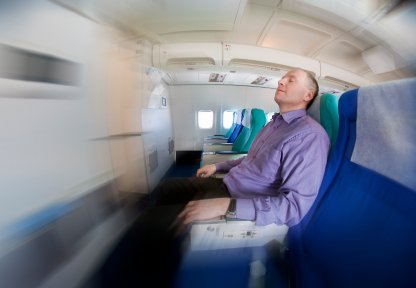 Even though it doesn’t always feel like it, we actually have quite a bit of control over our circadian rhythms. Sometimes, it really is as easy as mind over matter.
Even though it doesn’t always feel like it, we actually have quite a bit of control over our circadian rhythms. Sometimes, it really is as easy as mind over matter.
Conquering Jet Lag
Hit The Ground Running…Or Not
The first step to avoiding jet lag is simple: do what the natives do. If it’s 2 o’clock in the afternoon and the sun is shining, don’t go take a nap. Get out there! Drop your stuff at the hotel and take a walk around town or in the park. Your body will instantly perk up with all that exposure to Vitamin D. In the same regard, if it’s 11 PM, don’t decide to go clubbing until 5 just because you’re not tired yet. Force your body to get on track with the local time zone. Our bodies, and therefore our circadian rhythms, are extremely sensitive to light; we like to sleep when it’s dark and work when it’s light.
But if you don’t trust your body to adjust so quickly (which it probably won’t), then prepare ahead of time. If you can, try to sync your body to your destination time zone before you leave for the airport. Remember “mind over matter”? Well, this would be the situation
when that motto is perfectly applicable. After weeks and months of staying up until 11 at night, it’s going to be hard to force yourself to go to bed at 9 PM. Try setting your iPod on Enya’s greatest hits and pick up a Dickens book to read in bed. Hopefully that’ll be enough to nod you off to sleep. Warning: once your iPod’s on and your phone’s off, leave them alone. New studies show that the “blue light” emitted by electronics such as iPods, iPads, laptops, etc. activate your brain and keep you awake longer.
Let Your Body Relax
When trying to beat jet lag, the most important thing is to give your body the opportunity to sleep. This includes a lot of different things, including habits that we don’t even realize we have. The first thing, and perhaps a little too obvious to state, but oh well: go to bed. For real. Don’t sit on the couch or in front of your computer once you hit the hotel room for the night. For the same reason our phones keep us up, so does the television.
But even hours before you brush your teeth before bed, start prepping for a good night’s sleep. Avoid drinking caffeine as early as 6 or 7 hours before your bedtime. Caffeine has a half-life of 3-5 hours and its effects can last as long as 8-14 hours. Additionally, try to avoid drinking alcohol or consuming a heavy meal right before bed. And, whatever you do, don’t exercise late at night! Even if you just hopped off a plane and you think a quick workout will help tire you out, the opposite is true. Exercise will activate your endorphins and, in turn, keep you up. Just give your body some time to mellow out.
When In Doubt…
Try melatonin. Melatonin is an over-the-counter supplement that mimics the effects of our natural hormone. If you find yourself having real trouble adjusting across time zones, don’t be afraid to help your body along by taking a melatonin capsule roughly 6 hours before you hit the sack. It’s non-addictive and completely safe, and it might be just what you need to get your body on track.
If you don’t feel comfortable taking a pill, there are a couple other tricks from Mother Nature to help you adjust your sleeping cycle. Lavender oil is a great way to relax you and help you fall asleep. Just add a drop or two to your pillow at night and let the scent carry you away in your dreams. On the other hand, to help you wake up, place a few drops of rosemary oil on a tissue and sniff it. Rosemary oil is a stimulant and its scent can help perk you up throughout the day.
Anna Albi is a graduate from Carnegie Mellon University in Pittsburgh, PA, where she received a B.A. in Creative Writing with an additional major on Professional Writing. She is currently pursuing her Masters of Arts in Professional Writing, also at CMU. Feel free to reach out to her through Google+.


